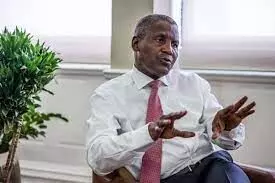- Home
- /
- Business/Economy
- /
- Dangote tasks Nigeria...
Dangote tasks Nigeria to transit to knowledge-based economy

Alhaji Aliko Dangote, Africa’s richest man and Chief Executive Officer of Dangote Group, has tasked Nigeria with moving from a resource-based economy to a knowledge-based economic system.
Supreme News reports that Dangote made the recommendation in a pre-convocation lecture delivered as part of activities lined up for the 38th convocation of Bayero University, Kano (BUK).
“Given the tremendous benefits that the knowledge economy offers, it is vital that Nigeria make the transition to a knowledge-based economy.
“Countries like South Korea, India, China, and the Asian Tigers at one time or another took the decision to institutionalise the knowledge economy and are today reaping the benefits.
“Ismail Radwan and Giulia Pellegrini stated in a World Bank publication that harnessing knowledge for development is not a new concept, as it has always been central to development and can mean the difference between poverty and wealth.
“They argued that the knowledge economy is not just about establishing high-tech industries and creating an innovative and entrepreneurial culture.
“Simply adopting existing technologies widely available in developed countries can dramatically boost productivity and economic growth,” he said.
He was represented by the Group Executive Director of the Dangote conglomerate, Mansur Ahmed.
Dangote quoted the World Bank as stating that for Nigeria to make the transition to knowledge economy, it must pay attention to the business environment, education and skills, innovation systems and information communication infrastructure.
He said Nigeria needed a conducive business environment that provided incentive for the efficient use of existing knowledge.
“There are many government
Research institutions and the existing knowledge gathered over the years can be put to use by firms.
“Agricultural research institutes have produced new varieties of seeds, legumes and others that are being cultivated in small quantities
in their demonstration farms.
”This is where the government should come in with incentives for firms that would make use of these new varieties.”
The government may decide to embark on the phasing out of older, low-yielding species of crops and provide incentives for those willing to plant the new ones in terms of subsidies, free fertiliser, and technical help from agriculture extension officers.
“Government through its agencies can help in insisting that firms and businesses apply existing knowledge in
their operations.
"The Nigerian government demonstrated this capacity in the auction and licencing of GSM operators. That singular move brought rapid changes to the communications sector and created millions of direct and indirect
jobs.
“It also resulted in the transfer of existing technologies to Nigeria, as the winners of the bids brought the requisite skills and technologies to build their networks.
“Nigerian youths that are passionate about new technologies should be encouraged and supported to exploit their natural talents by expanding entrepreneurship facilities and hubs.
“There should be reforms in our educational system with more emphasis on skill development than paper qualification.
”Innovators, foundersof businesses, and creators should be invited to speak,” Dangote said.
Dignitaries who attended the pre-convocation lecture included the Deputy President of the Senate, Barau Jibrin, and the Vice Chancellor of the University, Prof. Sagir Abbas.
More than 11,000 graduating students will receive degrees, while two distinguished personalities—the President of the African Development Bank, Dr. Akinwunmi Adesina, and Sen. Barau Jibrin—will be awarded honorary doctorate degrees at the convocation on Saturday.



